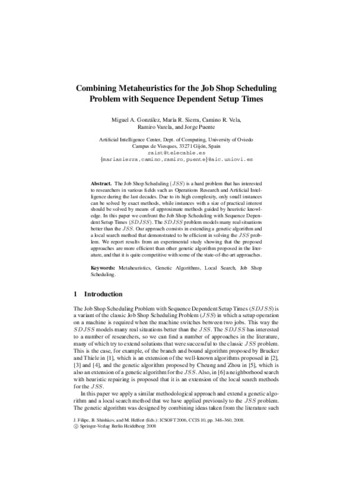Combining metaheuristics for the Job Shop Scheduling Problem with Sequence Dependent Setup Times
Publication date:
Editorial:
Springer
Publisher version:
Serie:
Communications in Computer and Information Science;10
Descripción física:
Abstract:
The Job Shop Scheduling (JSS) is a hard problem that has interested to researchers in various fields such as Operations Research and Artificial Intelligence during the last decades. Due to its high complexity, only small instances can be solved by exact methods, while instances with a size of practical interest should be solved by means of approximate methods guided by heuristic knowledge. In this paper we confront the Job Shop Scheduling with Sequence Dependent Setup Times (SDJSS). The SDJSS problem models many real situations better than the JSS. Our approach consists in extending a genetic algorithm and a local search method that demonstrated to be efficient in solving the JSS problem. We report results from an experimental study showing that the proposed approaches are more efficient than other genetic algorithm proposed in the literature, and that it is quite competitive with some of the state-of-the-art approaches
The Job Shop Scheduling (JSS) is a hard problem that has interested to researchers in various fields such as Operations Research and Artificial Intelligence during the last decades. Due to its high complexity, only small instances can be solved by exact methods, while instances with a size of practical interest should be solved by means of approximate methods guided by heuristic knowledge. In this paper we confront the Job Shop Scheduling with Sequence Dependent Setup Times (SDJSS). The SDJSS problem models many real situations better than the JSS. Our approach consists in extending a genetic algorithm and a local search method that demonstrated to be efficient in solving the JSS problem. We report results from an experimental study showing that the proposed approaches are more efficient than other genetic algorithm proposed in the literature, and that it is quite competitive with some of the state-of-the-art approaches
ISBN:
Identificador local:
281
Patrocinado por:
This research has been supported by FEDER-MCYTunder contractTIC2003-04153 and by FICYTunder grantBP04-021
Collections
- Capítulos de libros [6535]
- Informática [875]
Files in this item




